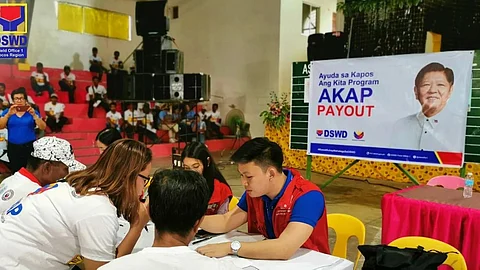
- NEWS
- the EDIT
- COMMENTARY
- BUSINESS
- LIFE
- SHOW
- ACTION
- GLOBAL GOALS
- SNAPS
- DYARYO TIRADA
- MORE

The controversy-plagued Ayuda para sa Kapos ang Kita Program (AKAP) will abruptly receive zero allocation in the proposed P6.793-trillion budget for next year, despite obtaining over P26 billion for two consecutive years beginning 2024.
Department of Budget and Management Secretary Ameenah Panagnandaman confirmed this during a briefing on Wednesday, shortly after turning over the National Expenditure Program to the House of Representatives, which will scrutinize the budget and pass it as the 2025 General Appropriations Bill.
“There are still remaining funds for 2025,” said Pangandaman in the vernacular, referring to the AKAP. “We received a P10 trillion in proposals from agencies, and given our limited fiscal space, we didn’t fund it.”
It’s unclear, however, if the excess funds could still be carried over or utilized in subsequent years since it’s not a continuing appropriation. Under the law, an annual appropriation that failed to be fully utilized by the end of a fiscal year shall be reverted to the General Fund and cannot be used unless specifically re-appropriated by a new law.
The zero funding for AKAP, however, is not final yet since it’s Congress that would craft the General Appropriations BILL (GAB).
AKAP is a program under the Department of Social Welfare and Development (DSWD) that provides one-time cash assistance to “near-poor” and employees from the formal or informal sector whose income falls below the minimum wage rate. The monetary aid ranges from P3,000 to P5,000.
The program was the brainchild of Speaker Martin Romualdez and Ako Bicol Rep. Zaldy Co. Two years after it was launched in 2023, AKAP had received substantial funding from the administration, obtaining P26.70 billion and P26.16 billion in the 2024 and 2025 GAA, respectively.
This year’s budget for AKAP was relatively lower than the initial proposal of P39.8 billion under the House-approved GAB. The Senate entirely deleted the AKAP in its version of the GAB, only to be restored at the last minute during the closed-door conference of the bicameral committee, whose members were composed only of selected members of the House and the Senate.
The P26.16 billion in AKAP funds was reportedly divided among House members and senators with P21 billion and P5 billion, respectively.
AKAP has been at the center of controversy for allegedly mirroring the pork barrel funds, formerly allocated to members of Congress, but later declared unconstitutional by the Supreme Court (SC) after it became a source of massive corruption.
The program further drew scathing criticism after Congress slashed a P12-billion budget of the Department of Education and allocated zero subsidies for the state health insurer PhilHealth, allegedly to fund the AKAP in the 2025 GAA.
Budget watchdogs have flagged the contentious AKAP, asserting that members of Congress are exploiting it as a political tool, especially during elections, citing previous instances where lawmakers were present during the dole-out.
Members of the House, however, insisted that the DSWD solely handles the allocation and that they play no role in disbursing the funds. Moreover, they claimed that their role is limited to overseeing and suggesting that the DSWD implement the social program in areas where it is needed.
There are a handful of petitions challenging the constitutionality of this year’s budget at the SC, including the one filed by allies of former president Rodrigo Duterte, led by Davao Rep. Isidro Ungab.
Duterte and Ungab earlier exposed that the bicam report of the 2025 budget contained missing amounts, with other allies accusing the House of later inserting P241 billion to fill the blanks.
Earlier, former House appropriation panel senior vice chair Stella Quimbo admitted that there were blank items in the bicam but insisted that funding for the said items was already identified before members of the bicam signed the report.
Complainants in the Ombudsman argued that the alleged insertion defeated the reason why Congress held a bicam conference to reconcile the conflicting provisions of the two versions of the national budget.
During his SONA in late July, President Marcos Jr. issued a stern warning to members of Congress that he would return the 2026 GAB should it contain line items that are not fully aligned with the administration’s proposed budget, regardless of whether it results in a reenacted budget.
A reenacted budget would mean that the previous year's GAA would remain in effect until both houses of Congress pass the current GAB. This could result in an economic slowdown and may hamper the delivery of government services as new programs and projects will be unfunded.
Marcos’ warning was triggered by the purported anomalies involving the multi-billion-peso flood control projects, which failed to resolve the flooding crisis in the country, and the alleged budget insertions.
The 2025 GAA, originally set at P6.352 trillion, was trimmed down to P6.326 trillion after Marcos vetoed P194 billion worth of line items deemed inconsistent with his administration's priority programs, P16.7 billion of which was for the flood control projects.
This year’s budget was also widely criticized for allegedly featuring padded unprogrammed and discretionary funds while subsidies for key sectors like education and healthcare suffered deep cuts.
